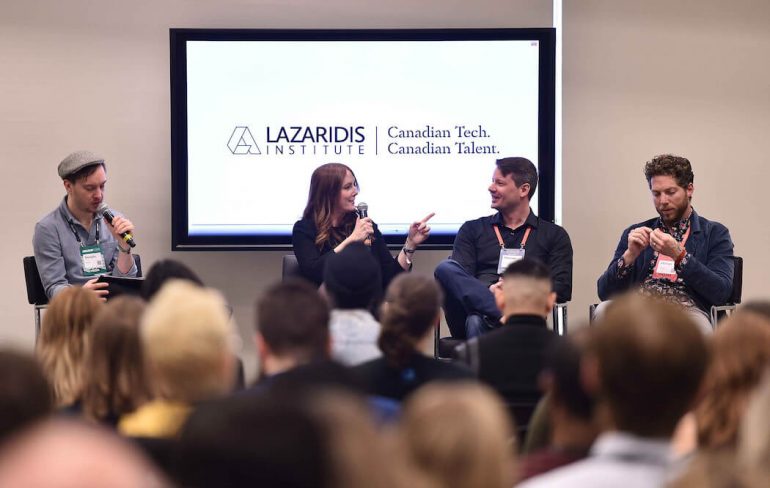No matter what stage a company is at, some things are universal and at #CollisionConf founder of Vidyard Michael Litt, founder of Faire Marcelo Cortes, as well as growth advisor for Sheertex Jacquelyn Cyr, shared their experiences on scaling a company.
At a panel moderated by BetaKit editor-in-chief Douglas Soltys, the three companies, spanning B2B SaaS, B2B marketplace, and B2C, all in different stages of growth, each shared their key learnings, success, and pitfalls thus far that have helped them get to where they are today.
The go fast button
“The go fast button happens at multiple times on a company’s journey and growth often doesn’t actually look like this linear curve for companies, it comes in a step function form,” stated Litt, referring to the moment when a company sees and seizes an opportunity to move the company forward.
“The go fast button happens at multiple times on a company’s journey and growth often doesn’t actually look like this linear curve.”
He noted that Vidyard, which he founded in 2011, right after coming out of university, has gone through and continues to go through experiences that change the trajectory of the business. One ‘go fast moment’ for Vidyard, Litt stated, was when the company was participating in Y Combinator and pivoted its product from a services business to a platform-based business.
“That mindset change [of switching product focus] was the go fast moment for us,” he said, noting that while changing focus was uncomfortable at first, with the support of an angel investor, Vidyard was able to make that change, and it became a ‘go fast moment’ that projected the company through to its Series C in 2016.
Faire, founded in 2016, had its moment of opportunity when it was going through a stage of quick growth at the end of 2017. The company is a retail marketplace that allows independent retailers to find new products from niche creators. In the beginning though, even with accelerated growth and interest in its platform, Cortes (also CTO of Faire) told the #CollisionConf audience that the company actually realized it was losing money. For every dollar sold, Faire (then Indigo Fair), was losing 20 cents.
Cortes and his fellow co-founders Max Rhodes (CEO) and Daniele Perito (chief data officer) decided to fix their unit economics. From there Faire raised a $12 million USD Series A and not long after raised a much larger $133 million CAD in December.
Cyr noted that Sheertex is almost going through its ‘go fast moment’ right now. A growth advisor for companies and chief builder for her own company JC+CO, which helps companies with scaling strategies, Cyr joined Sheertex a couple of months ago to help the creator of un-rippable pantyhose and clothing technology move to the next level.
Talent gap
All three leaders also noted the difficulties that come along in the hiring process as companies grow. Cortes stated that when a company is still young it can hire generalists but as businesses begin to scale processes change and there is a need to bring on more specialized people with experience in specific focus areas.
“We know how to do this and I’m not moving to California, we’re staying in Canada.”
-Marcelo Cortes
Cyr argued that as a B2C, product-oriented businesses, the Canadian talent pool makes it hard to find senior level ecommerce people with the right experience to help with that scaling.
Litt agreed with Cyr, stating that hiring senior level talent is one of the biggest hindrances for many Canadian companies, and something he has seen at Vidyard, as well as with his Garage Capital portfolio companies.
“Right now there aren’t dense population clusters [in Canada] that really attract senior go-to-market talent. At some point, that talent will get recruited into the mothership…that is the United States,” he said.
He noted that while things are changing with government immigration policies, 90 percent of his graduating class at the University of Waterloo left to work in the US. In contrast, all three companies on the panel, all having participated in Y Combinator, have resisted pressure from the US-based accelerator and other investors to leave Canada and set up camp in the US.
RELATED: Trudeau, Tory pitch Global Talent Stream, diversity to #Collisionconf attendees
Cortes stated that even with one office in San Francisco he has argued against moving Faire’s engineering team out of Kitchener.
“The core engineering team hear build the initial product…we’ve built a very successful product and we know how to do this and I’m not moving to California, we’re staying in Canada and we’re going to do it this way,” he told his investors, noting that today his investors are sold on the idea, after seeing it working successfully.
The panelists also talked about their experiences of hiring different types of people and talent for different stages, with Litt stating there are three kinds of people: mercenaries (who disrupt), chameleons (generalists and believers in the mission), and those who scale.
“Just be aware that there are different types of people and its stage dependent,” Litt advised. “[But] there is always a role for mercenaries and they are the ones that are going to keep you on your toes and keep things exciting.”
The trio also touched upon how they navigated pivoting their companies, whether that included Vidyard’s product change, or Faire’s name change. They also emphasized the importance of making sure to adapt to changes by implementing more rigid processes, with Litt and Cortes talking about creating annual mission documents that helps the whole company know what are the focus areas for the year.
Image courtesy Collision Conference via Flickr


